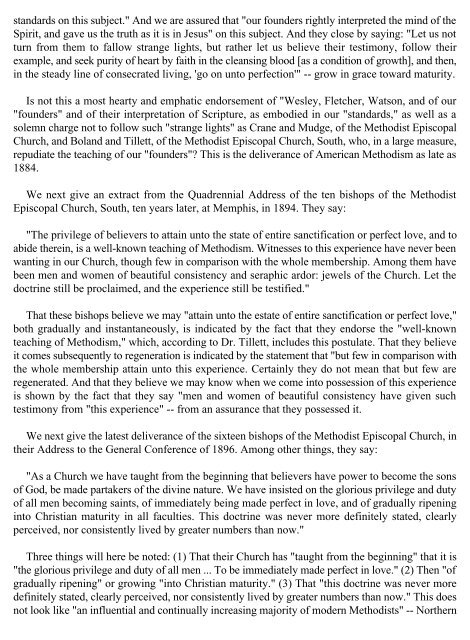Scriptural Sanctification - Media Sabda Org
Scriptural Sanctification - Media Sabda Org
Scriptural Sanctification - Media Sabda Org
Create successful ePaper yourself
Turn your PDF publications into a flip-book with our unique Google optimized e-Paper software.
standards on this subject." And we are assured that "our founders rightly interpreted the mind of the<br />
Spirit, and gave us the truth as it is in Jesus" on this subject. And they close by saying: "Let us not<br />
turn from them to fallow strange lights, but rather let us believe their testimony, follow their<br />
example, and seek purity of heart by faith in the cleansing blood [as a condition of growth], and then,<br />
in the steady line of consecrated living, 'go on unto perfection'" -- grow in grace toward maturity.<br />
Is not this a most hearty and emphatic endorsement of "Wesley, Fletcher, Watson, and of our<br />
"founders" and of their interpretation of Scripture, as embodied in our "standards," as well as a<br />
solemn charge not to follow such "strange lights" as Crane and Mudge, of the Methodist Episcopal<br />
Church, and Boland and Tillett, of the Methodist Episcopal Church, South, who, in a large measure,<br />
repudiate the teaching of our "founders"? This is the deliverance of American Methodism as late as<br />
1884.<br />
We next give an extract from the Quadrennial Address of the ten bishops of the Methodist<br />
Episcopal Church, South, ten years later, at Memphis, in 1894. They say:<br />
"The privilege of believers to attain unto the state of entire sanctification or perfect love, and to<br />
abide therein, is a well-known teaching of Methodism. Witnesses to this experience have never been<br />
wanting in our Church, though few in comparison with the whole membership. Among them have<br />
been men and women of beautiful consistency and seraphic ardor: jewels of the Church. Let the<br />
doctrine still be proclaimed, and the experience still be testified."<br />
That these bishops believe we may "attain unto the estate of entire sanctification or perfect love,"<br />
both gradually and instantaneously, is indicated by the fact that they endorse the "well-known<br />
teaching of Methodism," which, according to Dr. Tillett, includes this postulate. That they believe<br />
it comes subsequently to regeneration is indicated by the statement that "but few in comparison with<br />
the whole membership attain unto this experience. Certainly they do not mean that but few are<br />
regenerated. And that they believe we may know when we come into possession of this experience<br />
is shown by the fact that they say "men and women of beautiful consistency have given such<br />
testimony from "this experience" -- from an assurance that they possessed it.<br />
We next give the latest deliverance of the sixteen bishops of the Methodist Episcopal Church, in<br />
their Address to the General Conference of 1896. Among other things, they say:<br />
"As a Church we have taught from the beginning that believers have power to become the sons<br />
of God, be made partakers of the divine nature. We have insisted on the glorious privilege and duty<br />
of all men becoming saints, of immediately being made perfect in love, and of gradually ripening<br />
into Christian maturity in all faculties. This doctrine was never more definitely stated, clearly<br />
perceived, nor consistently lived by greater numbers than now."<br />
Three things will here be noted: (1) That their Church has "taught from the beginning" that it is<br />
"the glorious privilege and duty of all men ... To be immediately made perfect in love." (2) Then "of<br />
gradually ripening" or growing "into Christian maturity." (3) That "this doctrine was never more<br />
definitely stated, clearly perceived, nor consistently lived by greater numbers than now." This does<br />
not look like "an influential and continually increasing majority of modern Methodists" -- Northern
















